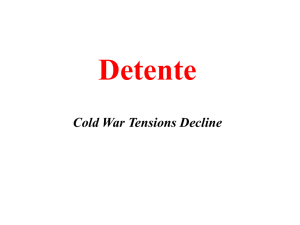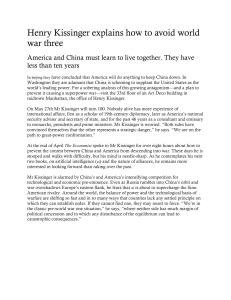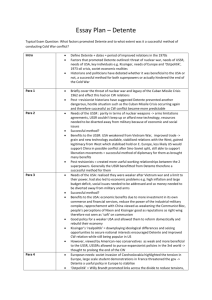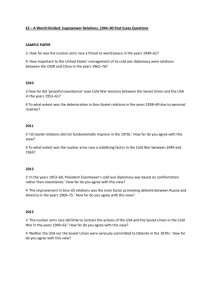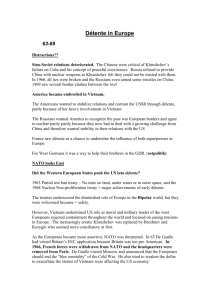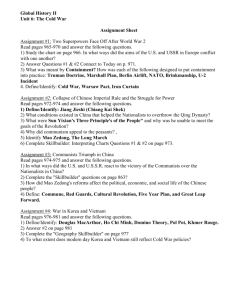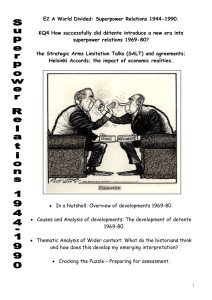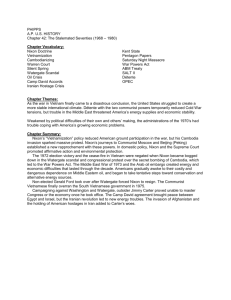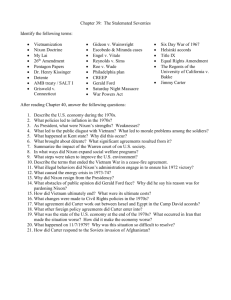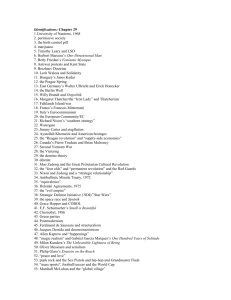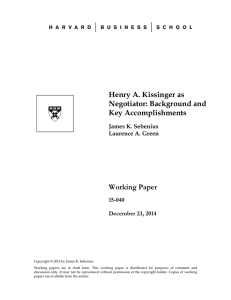The United States and the Onset of European Detente.
advertisement
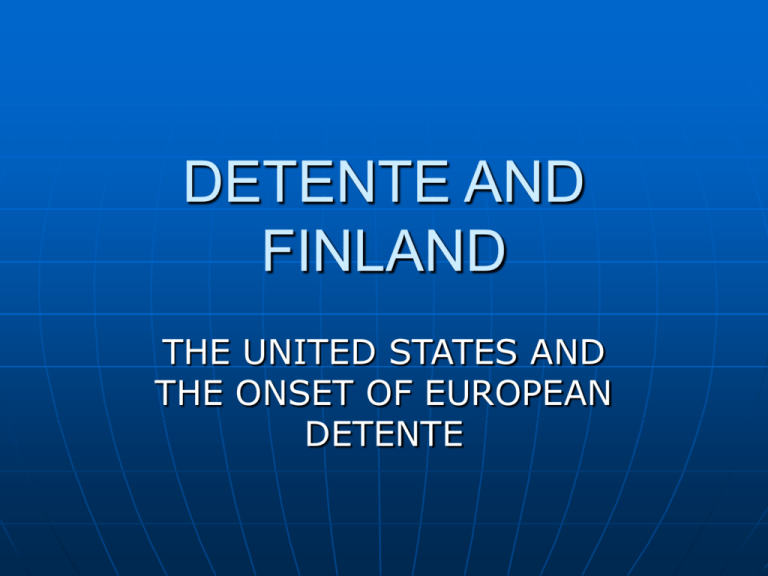
DETENTE AND FINLAND THE UNITED STATES AND THE ONSET OF EUROPEAN DETENTE OUTLINE GLOBAL CONTEXT OF U.S. FOREIGN POLICY SOVIET-AMERICAN DETENTE AND TRIANGULAR DIPLOMACY UNITED STATES AND EUROPE • JOHNSON AND DE GAULLE • NIXON AND OSTPOLITIK • CSCE GLOBAL CONTEXT Cold War Conundrums Regional Conflicts Relative Decline JOHNSON’S DETENTE “Each time I mentioned missiles, Kosygin talked about Arabs and Israelis.” “The Cold War is not over.” NIXON, DETENTE AND CHINA ”You’ve got three for three Mr. President.” -- Kissinger, October 12, 1972 JOHNSON vs. DE GAULLE “we’ve really got no control over their (France’s) foreign policy.” HARMEL REPORT, 1967 Military security and a policy of détente are not contradictory but complementary. Collective defence is a stabilizing factor in world politics. It is the necessary condition for effective policies directed towards a greater relaxation of tensions. The way to peace and stability in Europe rests in particular on the use of the Alliance constructively in the interest of détente. The participation of the USSR and the USA will be necessary to achieve a settlement of the political problems in Europe. NIXON & OSTPOLITIK “[there is] a danger that as Brandt pursues the quest for normalization, his advisers and supporters will eventually succeed in leading him to jeopardize Germany’s entire international position… assuming Brandt achieves a degree of normalization, he or his successor may discover before long that the hoped-for benefits fail to develop. Instead of ameliorating the division of Germany, recognition of the G[erman] D[emocratic] R[epublic] may boost its status and strengthen the Communist regime…. More fundamentally, the Soviets having achieved their first set of objectives may then confront the FRG with the proposition that a real and lasting improvement in the FRG’s relations with the GDR and other Eastern countries can only be achieved if Bonn loosens its Western ties.” -- Kissinger to Nixon, February 1970 “This meant that Washington wanted to have the last word.” -- Brandt YEAR OF EUROPE "The United States has global interests and responsibilities. Our European allies have regional interests." “For Kissinger to announce a Year of Europe was like for me to stand on Trafalgar Square and announce that we were embarking on a year to save America!” -- Edward Heath CSCE «They can write it in Swahili.» Kissinger Assessment, 1975 The CSCE has given the Russians something that they had long wanted very much, perhaps even come to over-value. But the Western Governments have gained also - in limiting and qualifying their endorsement of a situation they do not intend to change, in forcing the Russians to do battle on ground hitherto taboo and, not least, in cohesion and the practice of cooperation. Elsewhere too - in the Quadripartite Agreement on Berlin and in the development of Western exports to CMEA countries - the Soviet peace policy has been shown to carry advantages for the West as well. Assessment, 1975 Mishandled by the West, the pursuit of détente could lead to a Soviet walkover in Europe. But if Western countries continue, negotiation by negotiation, to stick together, to keep their guard up and to settle for nothing less than a fair balance of concrete advantage, they need not shrink from it. Détente of that kind would differ widely from the Soviet prospectus. And, in the longer perspective, the practice of détente may foster developments in Soviet policies which ultimately make the USSR a less intractable, even a more reliable, partner. THOMAS GARVEY, BRITISH AMBASSADOR TO FINLAND A BALANCE SHEET «In any case, what Europe thinks is basically irrelevant.» Kissinger EUROPEAN INFLUENCE ON AMERICAN POLICY GERMAN TREATIES, CSCE SOVIET-AMERICAN VS. EUROPEAN DETENTE
